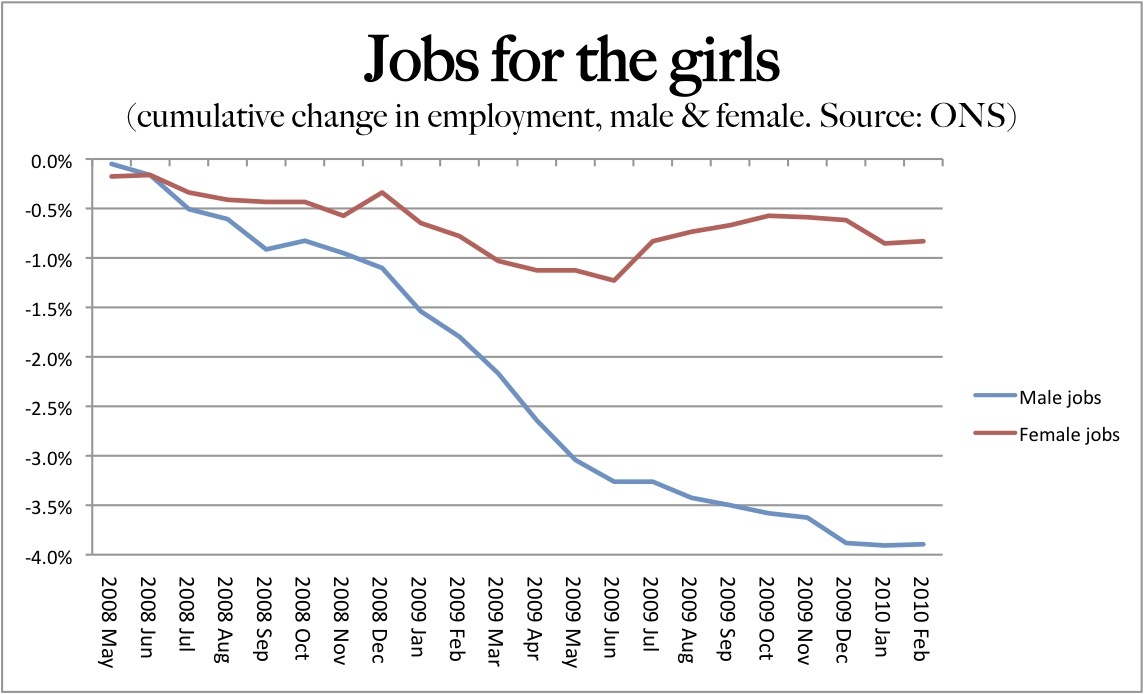Gender discrimination is illegal in Britain – but tell that to the recession. It has hit male jobs harder than female jobs and in a cover story for this week’s Spectator, Matthew Lynn looks behind it. This has been, he says, a Mancession, where “the jobs lost in the last two years have tended to be ones done by men, whereas the preponderance of new vacancies are in areas of the economy in which women do best.” I asked the ONS for the official figures – and here they are:

They show that, if you count everyone in Britain employed over the age of 16, there has been a 3.9 percent reduction in male jobs and just a 0.8 percent reduction in female jobs. In actual numbers,
the recession has (so far) taken 622,000 male jobs and 113,000 female jobs: a ratio of five-to-one. And the female/male mix is pretty even (woman are 47% or workforce). But, you might say, surely
men dominate the workplace anyway? Not anymore. As Matthew points out:
Recessions often serve to accelerate economic trends, and this recession has accelerated the mutation of the economy towards jobs that are more female-friendly, and away from the old working class male jobs. Jonathan Cusick drew this rather nicely for our cover this week (see here).“When US employment data for [January 2010] was published, economists noticed that, for the first time, there were more women working in America than men — 64.2 million compared to 63.4 million, to be precise. That represents a huge demographic shift: in 1950, more than twice as many men had jobs as women. The same socio-economic revolution is happening in Britain, although as usual we are a few years behind the Americans. Today, we have 15.3 million men at work, compared with 13.5 million women. That difference, 1.8 million, was 2.4 million just two years ago. If this trend continues, by 2013 there should be more women working than men.”
So we would be fooling ourselves to think that the man-cession is a blip trend that will unwind when the recession is over. Below is one of the most striking graphs that I have come across: it
shows that economic inactivity (ie those neither in work, nor looking for it) has remained pretty level in Britain over the last three decades. But this ‘UK average’ masks a stunning
rise in male inactivity, coupled to a fall in that of female inactivity. Every time there is a recession (shown in the blue bit) the male inactivity just gets ratcheted up to an ever-higher
level.

(Data kindly provided to The Spectator by the ONS on request)
This could be for many reasons. The number of stay-at-home dads is increasing – kept men is a rising phenomenon. But, similarly, there is a risk of unskilled young men doing nothing. When
Frank Field looks at the causes of social breakdown in Britain, he emphasises the gradual erosion of the types of jobs which these young men did in the past.
For decades, we have been worried about women in the workplace – the pay gap, discrimination etc. The rising phenomenon of under-employed men may present its own array of social problems. As
Matthew Lynn says in his signoff, it may not be long before policymakers are asking who is the weaker sex.







Comments